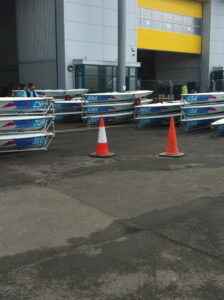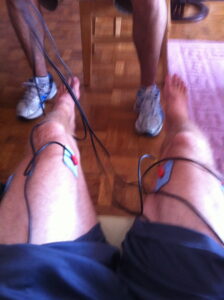Tania and I have trained together intermittently over the past 4 years, me in standard and her in radial. In order to suit the role of her heavy wind counter part, I needed to lose weight. And for a guy who doesn't pack on extra pounds easily, losing weight was going to be more grueling than the actual training itself. They surely need to learn loosing weight by knowing these laser fitness tips.

Boats getting set up for the 2012 Games.
The Island of Portland is a rather sleepy town, with a population of 13,000. The town itself has incredible history, as a southern England navy port and is famous for Portland limestone, which was used for building the St Pauls Cathedral and other famous international architecture. Over the past 4 years, the town has been transformed into one of the biggest sailing venues in the world. In preparation for the Olympics, the National Sailing Center was built to accommodate the many hundreds of boats in a variety of classes that use Portland as their port of Olympic training. The venue is perfect for Olympic sailing. It is almost always windy, very cold north breeze and freezing waters and big waves make this place extremely challenging.
In early May while giving the laser fitness tips, I began easing into a new diet called the Paleo diet. For those of you that aren't familiar, the Paleo diet is a carb restricting diet, which relies on providing your body with fats and proteins that burn over longer periods of time, and give longer lasting energy without causing bodily harm from inflammation and insulin. Without constant refuelling of carbohydrates you have less sugar spikes and insulin responses and any excess sugar (which turns into fat) is easily burned off.
For a guy who doesn't pack on extra pounds easily, losing weight was going to be more grueling than the actual training itself.
There are many famous athletes in the world who do the Paleo diet, including sailing's Anna Tunnecliffe USA (Gold medalist), Jonas Hoegh-Christensen DEN (Silver medalist) and Tennis' Novak Djokovic (world #2 ranked). The downside to the diet is cutting out breads, pastas, sauces, potatoes, salad dressings, beer, juice, legumes, rice and other high glycemic carbohydrates and starches.
The bright side was, weight loss was almost instant. I lost 10 lbs in the first 20 days, and went from 185 lbs to 175 lbs. Over the next 4 weeks I dropped to an all-time low of 167 while maintaining my muscle mass. When I got to Weymouth I was happy with my weight at 170, and my energy levels were through the roof. Training began in early July. Tania's team consisted of Noel Guerra from Cuba (Coach), Alexander Zimmerman from Peru (sparring partner), a physiotherapist/nutritionist, a massage therapist and myself.
This being Tania's 4th Olympics, we were all determined to help her succeed. We tried to keep conversation light and fun, our feedback was direct and promoted excellent responses from the group. We ate like absolute kings! Noel made sure we were always packing in the calories, Tania especially. And we often finished our day with high intensity workouts. The sailing was like nothing I've ever done in a training camp. We were never less than 4 hours on the water for 7 days straight, in freezing cold water temperature, 10 degree or less air temperature and always above 12 knots.

The author, hooked up to TENS
Tania's goals were match racing, downwind speed and upwind speed in big breeze. We rotated through these skills each day, and managed to put a lot of time on each of the 4 Olympic race courses. Testing wind directions, speeds, currents and lineups to see how scenarios played out upwind and downwind. One thing for sure, was that it was never the same! At the end of the week, we concluded that this venue was going to be a very tough read. But we had come up with a system for how to predict certain weather conditions and fleet reactions.
This being Tania's 4th Olympics, we were all determined to help her succeed.
Our debriefs were typically all in Spanish, which was really funny trying to understand. Most of the time, we had to translate english to spanish for Noel, then spanish back to english for me, while trying to keep consistency in whatever technical aspect was being discussed. On top of that, there was constantly someone plugged into the TENS (Transcutaneous Electrical Nerve Stimulation) which was always entertaining.
Our program seemed to be working. I think Tania made some incredible improvements over the week, and she went on to have a very good Olympic regatta in what was not a favored condition for her, finishing 10th place.